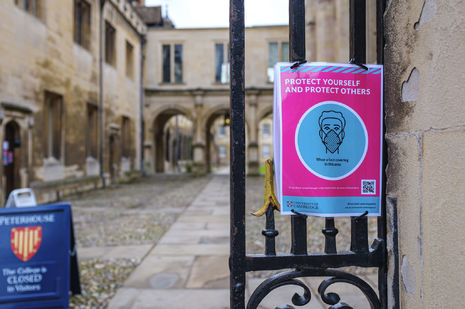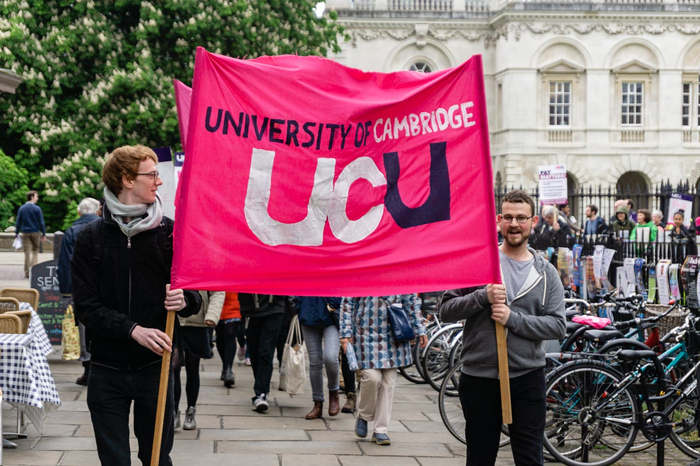College redundancies reveal impact of pandemic on non-academic staff
The University said in May 2020 that redundancies would only take place in ‘worst-case scenario’

Over 120 staff from across the University’s colleges, academic schools and non-academic institutions have faced redundancy or the non-renewal of fixed contracts since the beginning of March, data obtained through Freedom of Information (FOI) requests revealed.
Meanwhile, the number of non-academic staff at several colleges has decreased by up to 30 workers, while changes to overall staffing numbers at other colleges was in single figures or remained unchanged.
Among the 126 members of staff across the University (excluding those directly employed by colleges), 91 have not had fixed contracts renewed and 32 have been made redundant. The University employs over 6,000 non-academic staff members across the six academic schools which encompass all the faculties at the University.
When approached for comment on these statistics, a University spokesperson told Varsity: “The University of Cambridge has done everything in its power to support our more than 12,500 staff during the pandemic. The proportion of contracts that have ended over the past year, including fixed-term contracts, has remained low and consistent with previous years.”
Data shows that redundancies have varied across University departments. While many departments and faculties made no redundancies over the past year, the School of Biological Sciences did not renew 18 contracts, while 24 of the 32 redundancies implemented across University faculties were linked to the School.
These figures exclude redundancies made as a result of fixed-term contracts coming to an end. A total of 91 additional staff have not had their fixed-term contracts renewed over the past year, including 21 “non-school” staff not working in academic departments.
In September, a Varsity investigation reported that Downing College planned to make 27 staff redundant. Data from FOIs show that Downing followed through with 25 of these redundancies, including five voluntary redundancies.
Downing’s non-academic workforce decreased from 185 to 150 between March of 2020 and 2021. Sixteen of these were former housekeeping staff, and a further 9 worked in catering.
While it is the University’s policy that they will attempt to redeploy staff facing redundancy, only one staff member at Downing stayed on in a different role.
Housekeeping staff were similarly affected at Sidney Sussex College, where all 12 of the redundancies made affected this group of staff.
Queens’ College also received particular attention in 2020 for their planned redundancies for the beginning of the 2020-21 academic year, with 32 planned compulsory redundancies. In a statement released in September, the College stated that “no compulsory redundancies [were] required [and that] sixteen members of staff [had] requested voluntary redundancy with a financial package, [while] staff in some of the operating departments have agreed to some reduced hours of working.”
At the time, a staff member at the College told Varsity: “It’s very stressful and emotional. In the middle of a global pandemic, losing your job with a month’s notice is so scary. The students have been amazing, it means so much to us all when we see students fight on our behalf.”
The updated FOI results for Queen’s College demonstrate that 16 staff members faced voluntary redundancies, while a small number of contracts were not renewed.
The Cambridge University Justice 4 Workers Campaign told Varsity: “The colleges should be dipping into their significant reserves to deal with the cost of the pandemic, not passing those costs onto their lowest paid workers through redundancies. ... Many workers, who haven’t been made redundant, are still forced into precarity by low wages, casual contracts and a lack of unionisation.”
Meanwhile, Cambridge Students’ Union (SU) told Varsity that the treatment of workers during the pandemic was “shameful”: “It has become clear that irrespective of different employment practices across the collegiate University, there is one consistent standard; low pay and poor working conditions [...] Despite a number of colleges paying a living wage, many continue to fall far below a basic and dignified income, with it being those on casual contacts most likely to be denied a fair wage.”
“The job losses we have seen over the past year are just a symptom of the collegiate University’s consistent mismanagement, underpayment and casualisation of its non-academic staff.”
Despite college and faculty-specific redundancies, the figures show that the University has not reached the “worst-case scenario” of “generalised redundancies” outlined by Vice-Chancellor Stephen Toope in an email sent to staff in May 2020 about the financial impact of the coronavirus pandemic.
In January this year, the University’s Board of Scrutiny reported that despite the pandemic “the University’s income streams are more robust than previously thought”, and that “the measurable direct net financial impact on the Chest so far seems to have been more or less negligible”. They called the University’s modelling in 2020 “excessively pessimistic”.
Addressing working conditions earlier this year, the Cambridge Student Union (SU) and Cambridge University and Colleges Union (UCU) released a statement saying: “It is shocking that the lowest paid staff in this University have been forced to shoulder the financial burden of this crisis, while the highest paid have been allowed to make a choice about their financial contributions to the University’s pandemic response.”
“These measures also contradict the expressed commitment of the University of Cambridge to review its recruitment practices with a view to address casualisation, for example through the work of the anti-casualisation subgroup of the partnership working group,” they continued.
More recently, the UCU and SU also launched the Justice4CollegeSupervisors campaign, which calls for amendments to the supervision pay rate to “reflect the full number of hours spent on class preparation”, and “employment contracts for casualised teachers who supervise undergraduates for colleges.”
Sidney Sussex, Downing, Clare, Corpus Christi Colleges and the School of Biological Sciences did not respond to Varsity’s request for comment.
This article was amended to reflect that King's College responded to Varsity's request for comment.
 News / Caius mourns its tree-mendous loss23 December 2025
News / Caius mourns its tree-mendous loss23 December 2025 News / Clare Hall spent over £500k opposing busway 24 December 2025
News / Clare Hall spent over £500k opposing busway 24 December 2025 Comment / Yes, I’m brown – but I have more important things to say22 December 2025
Comment / Yes, I’m brown – but I have more important things to say22 December 2025 Interviews / Politics, your own way: Tilly Middlehurst on speaking out21 December 2025
Interviews / Politics, your own way: Tilly Middlehurst on speaking out21 December 2025 News / King appoints Peterhouse chaplain to Westminster Abbey22 December 2025
News / King appoints Peterhouse chaplain to Westminster Abbey22 December 2025










